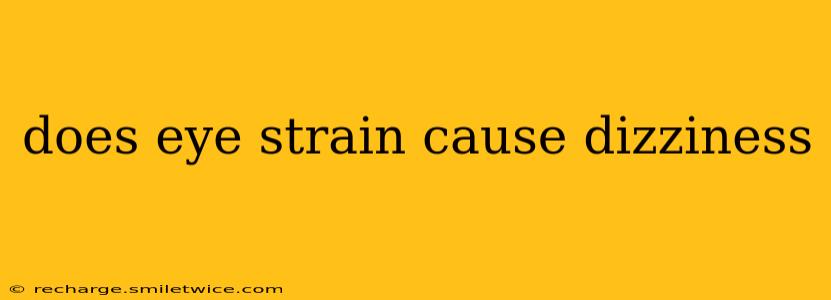Eye strain, that uncomfortable feeling of tired, achy eyes, is a common ailment in today's digital age. Many experience it after prolonged screen time, reading, or focusing on detailed tasks. But does this common discomfort lead to dizziness? The answer is a nuanced yes, with several factors influencing the relationship between eye strain and dizziness. Let's delve into the details.
How Can Eye Strain Lead to Dizziness?
The connection isn't always direct, but eye strain can contribute to dizziness through several mechanisms:
-
Convergence Insufficiency: This condition involves difficulty coordinating the eye muscles to focus on near objects. When your eyes struggle to converge properly, it can cause eye strain, headaches, and even dizziness or vertigo. The brain receives conflicting signals from the eyes, potentially leading to a sense of imbalance.
-
Accommodative Spasm: This involves the eye muscles that control focusing becoming cramped and fatigued. Similar to convergence insufficiency, this can lead to blurry vision, headaches, and dizziness, as the eyes struggle to maintain focus and the brain processes conflicting visual input.
-
Asthenopia: This is a general term for eye strain, encompassing various symptoms like headaches, blurred vision, and double vision. Dizziness can be one of the symptoms experienced in severe cases of asthenopia. The constant strain on the eye muscles and the subsequent discomfort can affect the overall balance and coordination of the body.
-
Underlying Medical Conditions: While eye strain itself doesn't directly cause dizziness, it can exacerbate underlying conditions like migraines or vestibular disorders (affecting balance). The added visual strain can trigger or worsen symptoms, leading to dizziness.
What are the Symptoms of Eye Strain Related Dizziness?
Differentiating dizziness solely caused by eye strain from dizziness due to other causes can be challenging. However, some symptoms often associated with eye strain-related dizziness include:
- Blurry vision: Difficulty focusing or seeing clearly, especially after prolonged visual tasks.
- Headaches: Often located around the temples or forehead.
- Neck pain: Stiffness or pain in the neck and shoulders due to posture during prolonged visual activities.
- Lightheadedness: A general feeling of faintness or unsteadiness.
- Vertigo: A more intense sensation of spinning or room movement.
Can Eye Strain Cause Vertigo?
While less common than lightheadedness, eye strain can contribute to vertigo in some cases, particularly when related to convergence insufficiency or accommodative spasm. The brain's processing of conflicting visual signals from the eyes can trigger the sensation of spinning or movement. However, vertigo is often associated with inner ear problems, so it’s crucial to rule out other causes.
How to Differentiate Dizziness from Other Causes?
Because dizziness can stem from various sources, including inner ear problems, neurological issues, and cardiovascular problems, it is crucial to consult an ophthalmologist or healthcare professional to pinpoint the exact cause. They can conduct a thorough eye examination and assess overall health to determine the underlying cause of your dizziness.
What are Some Tips to Reduce Eye Strain?
Following these tips can significantly reduce eye strain and potentially lessen associated dizziness:
- Follow the 20-20-20 rule: Every 20 minutes, look at an object 20 feet away for 20 seconds.
- Adjust screen brightness and contrast: Ensure your screens are not too bright or dim.
- Take regular breaks: Avoid prolonged periods of near-work activities.
- Maintain proper posture: Sit upright with good posture to reduce neck and shoulder strain.
- Use artificial tears: Lubricating eye drops can help alleviate dryness and discomfort.
- Consider blue light glasses: These can help filter out potentially harmful blue light emitted from electronic screens.
Remember, while eye strain and dizziness can be linked, they aren't always directly causal. If you experience persistent or severe dizziness, it's crucial to seek professional medical advice to rule out other health conditions. A comprehensive evaluation will help determine the root cause and guide appropriate treatment.
